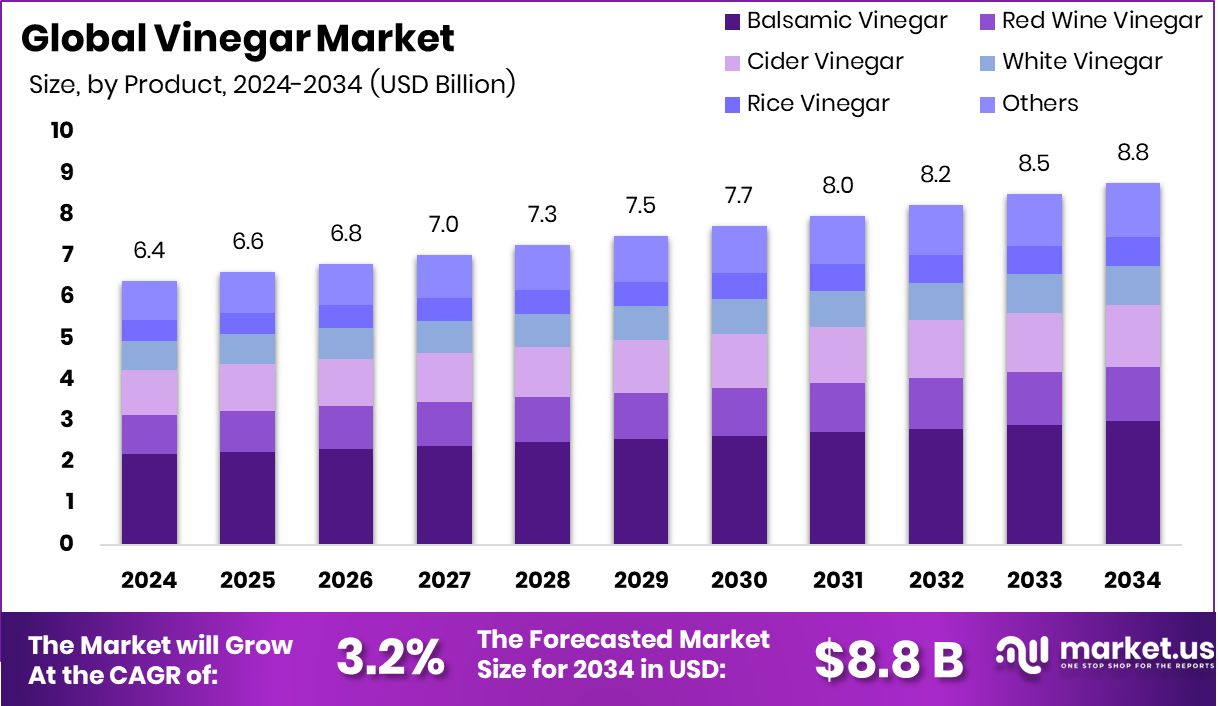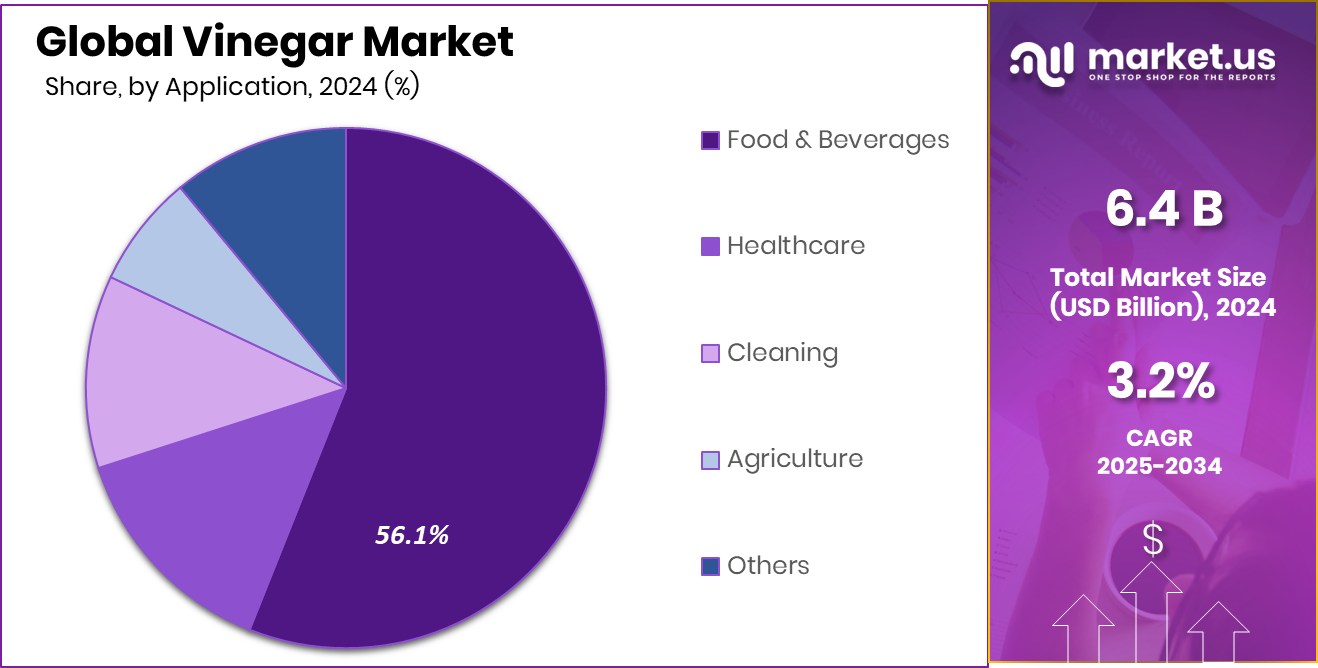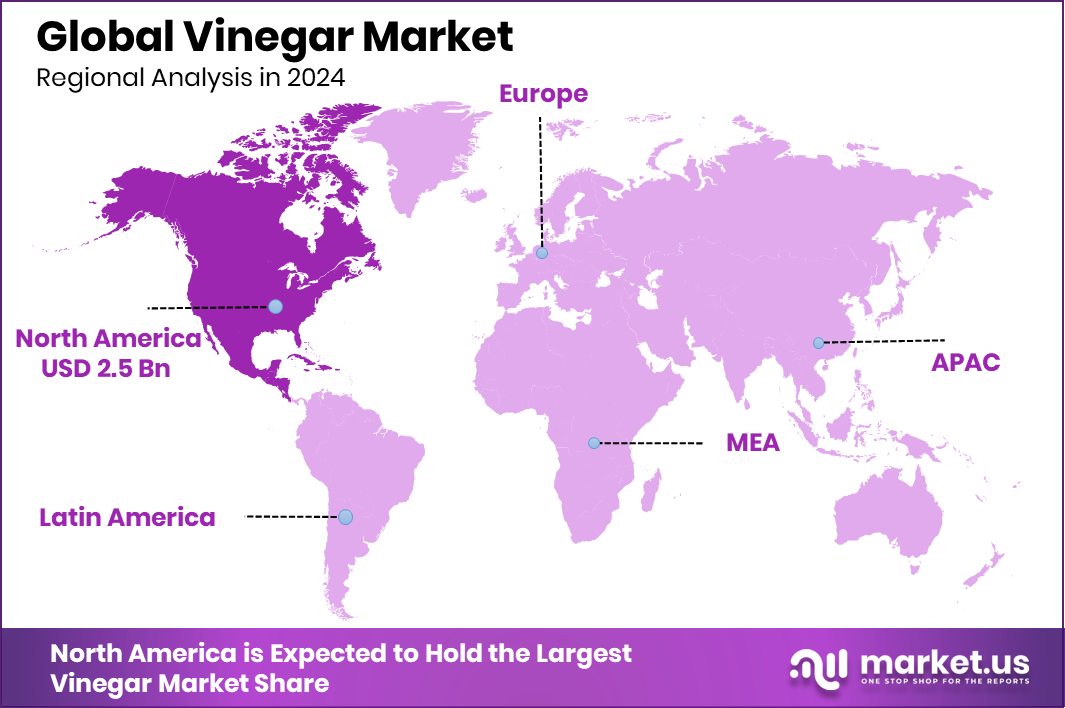Global Vinegar Market Size, Share, And Business Benefits By Product (Balsamic Vinegar, Red Wine Vinegar, Cider Vinegar, White Vinegar, Rice Vinegar, Others), By Source (Organic, Synthetic), By Flavor (Apple, Garlic, Lemon, Other), By Application (Food and Beverages, Healthcare, Cleaning, Agriculture, Others), By Distribution Channel (Supermarkets and Hypermarkets, Convenience Stores, Specialty Stores, Online, Other), By Region and Companies - Industry Segment Outlook, Market Assessment, Competition Scenario, Trends, and Forecast 2025-2034
- Published date: July 2025
- Report ID: 152053
- Number of Pages: 381
- Format:
-
keyboard_arrow_up
Quick Navigation
Report Overview
Global Vinegar Market is expected to be worth around USD 8.8 billion by 2034, up from USD 6.4 billion in 2024, and grow at a CAGR of 3.2% from 2025 to 2034. With a 39.1% market share, North America dominates global vinegar consumption trends confidently.
Vinegar is a liquid produced through the fermentation of ethanol by acetic acid bacteria. It typically contains 4–8% acetic acid by volume and is widely used as a culinary ingredient, preservative, and cleaning agent. The types of vinegar vary based on the source of fermentation, such as apple cider, wine, rice, malt, or synthetic alcohol. Besides cooking, vinegar has long been valued for its antimicrobial properties and applications in health and wellness, household cleaning, and even agriculture.

The vinegar market is experiencing consistent growth driven by changing dietary patterns and the increasing preference for natural food products. Consumers are increasingly incorporating vinegar into their daily diet for its perceived health benefits, including improved digestion, blood sugar regulation, and weight management. The popularity of apple cider vinegar and other organic varieties continues to surge, especially in urban populations focused on wellness and preventive healthcare.
Demand for vinegar is also growing in food processing industries, where it is used as a preservative and flavor enhancer. Rising consumer awareness of chemical-free preservation methods has led to greater interest in natural acidic solutions, pushing vinegar’s usage beyond household kitchens into commercial applications like packaged foods, condiments, and ready-to-eat meals.
Key Takeaways
- Global Vinegar Market is expected to be worth around USD 8.8 billion by 2034, up from USD 6.4 billion in 2024, and grow at a CAGR of 3.2% from 2025 to 2034.
- In the vinegar market, balsamic vinegar leads by product segment with a 34.2% market share globally.
- Synthetic vinegar dominates the market by source, accounting for 68.8% due to affordability and industrial usage.
- Lemon-flavored vinegar holds the highest share by flavor, contributing 36.2% to the overall vinegar market.
- Food and beverages application drives the vinegar market significantly, representing 56.1% of total consumption volume.
- Supermarkets and hypermarkets lead vinegar sales channels, holding a 38.5% share in global distribution networks.
- Strong health awareness and natural product demand support North America’s USD 2.5 billion vinegar market.
By Product Analysis
Balsamic vinegar leads the vinegar market with 34.2% product share globally.
In 2024, Balsamic Vinegar held a dominant market position in the By Product segment of the Vinegar Market, with a 34.2% share. This significant share reflects the strong consumer preference for balsamic vinegar due to its rich flavor profile, versatility in culinary applications, and growing adoption in health-conscious diets. Its widespread use in salad dressings, marinades, and gourmet cooking has contributed to its leading position, especially in urban households and foodservice settings.
The increasing interest in traditional and authentic food ingredients has further supported the demand for balsamic vinegar, particularly among consumers seeking premium quality and natural flavor enhancers. Moreover, its use in value-added products and gourmet food preparations continues to expand, reinforcing its market dominance. As consumers increasingly seek balanced flavor and health benefits, balsamic vinegar remains a preferred choice, aligning with trends that favor fermented and naturally sourced ingredients.
The segment’s 34.2% share highlights its established role and consistent consumer appeal in the global vinegar market. Given its culinary flexibility and association with clean-label products, balsamic vinegar is well-positioned to maintain its lead within the product category, particularly in regions with mature culinary markets and health-focused consumers.
By Source Analysis
Synthetic source dominates the vinegar market, accounting for 68.8% overall share.
In 2024, Synthetic held a dominant market position in the By Source segment of the Vinegar Market, with a 68.8% share. This substantial share highlights the widespread adoption of synthetic vinegar across various commercial and household applications due to its affordability, high acidity, and extended shelf life. Synthetic vinegar is commonly used in large-scale food processing, cleaning, and industrial purposes where cost efficiency and consistent formulation are critical.
Its dominance in the market is also supported by its suitability for mass production, allowing manufacturers to meet high-volume demand in both developing and developed economies. The neutral flavor and standardized composition make synthetic vinegar a preferred choice in packaged foods, ready-to-eat meals, and institutional kitchens where natural variations are less desirable. Furthermore, synthetic vinegar’s stability under different storage conditions enhances its usability across diverse environments, contributing to its high adoption rate.
The 68.8% market share reflects its entrenched position in the global supply chain, particularly in sectors requiring bulk vinegar applications at lower costs. With consistent demand from food manufacturers and industrial users, synthetic vinegar continues to be the primary source segment, maintaining a leading position in the vinegar market through its scalability, cost-effectiveness, and broad functional applications.
By Flavor Analysis
Lemon flavor holds 36.2% in the vinegar market’s flavor segment.
In 2024, Lemon held a dominant market position in the By Flavor segment of the Vinegar Market, with a 36.2% share. This leading position reflects strong consumer preference for citrus-based flavor profiles that are widely accepted across both culinary and non-culinary applications. Lemon-flavored vinegar is especially favored for its fresh, tangy taste, which complements a variety of dishes, including salads, marinades, seafood, and dressings.
Its natural citrus notes also enhance the sensory appeal of prepared foods, making it a popular choice among health-conscious and flavor-seeking consumers alike. The dominance of lemon flavor in the vinegar market is supported by its versatility and familiarity, encouraging broader use across domestic kitchens and foodservice settings. Additionally, lemon vinegar is often perceived as a cleaner, more refreshing option, aligning with the increasing demand for products that combine taste and perceived wellness benefits.
The 36.2% market share underscores its appeal in both traditional and modern cooking applications. With continued interest in flavorful yet balanced condiments, lemon vinegar remains a top choice among flavored vinegar varieties, sustaining its strong position in the global market.
By Application Analysis
Food and beverages application drives 56.1% of the vinegar market demand.
In 2024, Food and Beverages held a dominant market position in the By Application segment of the Vinegar Market, with a 56.1% share. This leading share is driven by vinegar’s widespread use in cooking, food preservation, flavor enhancement, and condiment preparation. It plays a central role in culinary applications across various cultures, adding acidity, balance, and depth to dishes.
The demand for vinegar in food and beverage applications remains strong, particularly due to its role in sauces, marinades, pickles, and salad dressings. Its natural preservation qualities also contribute to its growing use in packaged and processed food products, where clean-label and chemical-free ingredients are increasingly preferred. The 56.1% market share reflects its essential role in everyday food preparation, both in households and in the foodservice industry.
Vinegar’s compatibility with a wide range of ingredients and its ability to enhance both taste and shelf life make it an indispensable component in food processing and cooking. As culinary preferences continue to evolve and the demand for natural flavoring agents grows, the food and beverages segment is expected to maintain its dominance.

By Distribution Channel Analysis
Supermarkets and hypermarkets capture 38.5% share in the vinegar market distribution.
In 2024, Supermarkets and Hypermarkets held a dominant market position in the By Distribution Channel segment of the Vinegar Market, with a 38.5% share. This dominance is primarily attributed to the widespread availability of vinegar products across organized retail formats, offering consumers the convenience of one-stop shopping. These retail outlets provide an extensive range of vinegar types, sizes, and flavors, catering to diverse customer preferences under one roof.
Their ability to display and promote products through in-store sampling, discounts, and visibility on shelves plays a crucial role in driving higher consumer engagement and repeat purchases. The 38.5% share highlights the strength of these channels in reaching urban and semi-urban households, where weekly grocery shopping at supermarkets and hypermarkets is a common routine. Additionally, trusted brand presence, competitive pricing, and easy product comparison contribute to strong consumer preference for this distribution channel.
Bulk purchase options and combo packs further support sales volume through these outlets. The dominance of supermarkets and hypermarkets is expected to continue, driven by their structured supply chains, consistent stock availability, and the growing trend of consumers seeking convenience and variety during their routine grocery visits.
Key Market Segments
By Product
- Balsamic Vinegar
- Red Wine Vinegar
- Cider Vinegar
- White Vinegar
- Rice Vinegar
- Others
By Source
- Organic
- Synthetic
By Flavor
- Apple
- Garlic
- Lemon
- Other
By Application
- Food and Beverages
- Healthcare
- Cleaning
- Agriculture
- Others
By Distribution Channel
- Supermarkets and Hypermarkets
- Convenience Stores
- Specialty Stores
- Online
- Other
Driving Factors
Rising Health Awareness Boosts Natural Vinegar Usage
One of the top driving factors for the growth of the vinegar market is the rising health awareness among consumers. People are becoming more mindful about what they eat and are shifting towards natural and minimally processed products. Vinegar, especially varieties like apple cider vinegar and rice vinegar, is widely seen as a natural health booster.
It is commonly used to support digestion, manage blood sugar levels, and aid in weight loss. This growing preference for clean-label and functional food ingredients has led to increased demand for vinegar in both home kitchens and the health food sector. As more consumers choose food products with added health benefits, the use of vinegar is expected to grow steadily across global markets.
Restraining Factors
Strong Smell and Taste Limits Consumer Appeal
One of the key restraining factors in the vinegar market is its strong smell and sharp taste, which may not appeal to every consumer. While vinegar is valued for its health benefits, many people find its pungent aroma and acidic flavor unpleasant, especially when consumed directly or in large quantities. This limits its use in daily diets for some consumers, particularly in regions where vinegar is not traditionally part of local cuisine.
Additionally, the strong taste can make it challenging to incorporate into certain food or beverage products without altering the flavor profile significantly. This sensory barrier can slow down wider adoption, especially among younger consumers or those new to vinegar-based products.
Growth Opportunity
Flavored and Infused Vinegar Meets Consumer Demand
A major growth opportunity in the vinegar market lies in the development of flavored and infused vinegar products. By blending fruits, herbs, spices, or even floral notes into traditional vinegars, producers can cater to consumers seeking variety and unique taste experiences. These artisan-style vinegars also align with the growing trend toward gourmet and heritage cooking, as they provide an easy way to elevate everyday dishes like salads, marinades, and dressings.
Additionally, visually appealing infused vinegars can draw in shoppers as attractive kitchen staples or gifts. As more home cooks and food enthusiasts look for ways to enhance flavor without added sugars or artificial ingredients, flavored and infused vinegar presents a low-cost, high-impact path for market expansion and product innovation.
Latest Trends
Eco-Friendly Vinegar Products Gain More Attention
One of the latest trends in the vinegar market is the growing popularity of eco-friendly and sustainable vinegar products. Consumers are becoming more conscious about the environmental impact of the items they purchase, including food and household goods. Vinegar, being a natural and biodegradable product, fits well into this shift.
Additionally, vinegar is increasingly being used as a green alternative to chemical-based cleaners in homes. This trend reflects a broader movement toward clean living, where people prefer natural solutions that are safe for both their health and the environment. Such preferences are creating strong demand for sustainable vinegar options worldwide.
Regional Analysis
North America leads the vinegar market with a 39.1% share, worth USD 2.5 billion.
The global vinegar market demonstrates varied regional performance, with North America emerging as the dominant region. In 2024, North America accounted for the largest market share at 39.1%, valued at approximately USD 2.5 billion. This strong position is primarily driven by increasing consumer interest in natural and health-focused food products, along with the region’s widespread use of vinegar in both culinary and non-food applications such as cleaning and wellness routines.
Europe also maintains a significant presence in the market, supported by traditional culinary practices that incorporate different types of vinegar, particularly in Mediterranean and Central European cuisines. Asia Pacific follows with growing demand fueled by expanding urban populations and the use of vinegar in preserved and fermented foods. In regions like the Middle East & Africa and Latin America, the market remains relatively smaller but shows potential due to changing food habits and increased exposure to global food trends.
While these regions currently account for lower revenue contributions, rising awareness and the adoption of vinegar in daily cooking and health practices are expected to support future growth. North America, however, continues to hold its leading position due to its established consumption base, diverse product availability, and consumer preference for natural and functional ingredients.

Key Regions and Countries
- North America
- US
- Canada
- Europe
- Germany
- France
- The UK
- Spain
- Italy
- Rest of Europe
- Asia Pacific
- China
- Japan
- South Korea
- India
- Australia
- Rest of APAC
- Latin America
- Brazil
- Mexico
- Rest of Latin America
- Middle East & Africa
- GCC
- South Africa
- Rest of MEA
Key Players Analysis
De Nigris, renowned for its balsamic and specialty vinegars, maintains a strong foothold within the premium and gourmet segments. The company’s emphasis on traditional production methods and high-quality ingredients resonates well with discerning consumers. By leveraging authentic Italian provenance, De Nigris reinforces its brand equity, enabling sustained growth in markets that prioritize heritage and taste sophistication.
Australian Vinegar differentiates itself through sourcing locally produced ingredients and a focus on regional distribution. Its agile supply chain enables rapid response to emerging consumer trends, including organic and artisanal product demands. This adaptability, combined with support for domestic agriculture, helps the company cultivate a loyal customer base in both retail and foodservice sectors.
Fleischmann’s Vinegar Company, backed by a legacy of culinary reassurance, continues to lead in mass-market segments. Its expansive product lineup caters to traditional household applications, including cooking, pickling, and cleaning. Fleischmann’s extensive distribution network ensures widespread product availability, strengthening the brand’s position in supermarkets and hypermarkets globally.
The Kraft Heinz Company further enhances market competitiveness through its inclusion of vinegar-based condiments and sauces within broader food portfolios. By integrating vinegar into well-established sauce and dressing brands, Kraft Heinz benefits from cross-category consumer exposure. Its marketing capabilities and scale provide a significant advantage in shelf visibility, co-branding initiatives, and promotional strategies.
Top Key Players in the Market
- De Nigris
- Australian Vinegar
- Fleischmann’s Vinegar Company
- The Kraft Heinz Company
- Mizkan America, Inc.
- Burg Groep B.V.
- Aspall
- Shanxi Shuita Vinegar Co. Ltd.
- Carl Kühne KG
- Eden Foods
- Galletti S.p.A.
- Marukan Vinegar Inc.
- ACETUM
Recent Developments
- In July 2025, ACETUM won the Italian Food Award USA during the Summer Fancy Food Show. The accolade was granted for its innovative Mazzetti Habanero Hot Chili Glaze, which blends 60% Balsamic Vinegar of Modena PGI with Italian-grown habanero chili.
- In February 2025, Molson Coors (parent company) committed to investing £10 million over five years in Aspall’s Suffolk-based Cyder House. The funds are allocated for facility upgrades, expanded production capacity, and sustainable improvements. This investment is set to strengthen Aspall’s core business, including its renowned cyder vinegars.
Report Scope
Report Features Description Market Value (2024) USD 6.4 Billion Forecast Revenue (2034) USD 8.8 Billion CAGR (2025-2034) 3.2% Base Year for Estimation 2024 Historic Period 2020-2023 Forecast Period 2025-2034 Report Coverage Revenue Forecast, Market Dynamics, Competitive Landscape, Recent Developments Segments Covered By Product (Balsamic Vinegar, Red Wine Vinegar, Cider Vinegar, White Vinegar, Rice Vinegar, Others), By Source (Organic, Synthetic), By Flavor (Apple, Garlic, Lemon, Other), By Application (Food and Beverages, Healthcare, Cleaning, Agriculture, Others), By Distribution Channel (Supermarkets and Hypermarkets, Convenience Stores, Specialty Stores, Online, Other) Regional Analysis North America – US, Canada; Europe – Germany, France, The UK, Spain, Italy, Rest of Europe; Asia Pacific – China, Japan, South Korea, India, Australia, Singapore, Rest of APAC; Latin America – Brazil, Mexico, Rest of Latin America; Middle East & Africa – GCC, South Africa, Rest of MEA Competitive Landscape De Nigris, Australian Vinegar, Fleischmann’s Vinegar Company, The Kraft Heinz Company, Mizkan America, Inc., Burg Groep B.V., Aspall, Shanxi Shuita Vinegar Co. Ltd., Carl Kühne KG, Eden Foods, Galletti S.p.A., Marukan Vinegar Inc., ACETUM Customization Scope Customization for segments, region/country-level will be provided. Moreover, additional customization can be done based on the requirements. Purchase Options We have three licenses to opt for: Single User License, Multi-User License (Up to 5 Users), Corporate Use License (Unlimited User and Printable PDF) 
-
-
- De Nigris
- Australian Vinegar
- Fleischmann's Vinegar Company
- The Kraft Heinz Company
- Mizkan America, Inc.
- Burg Groep B.V.
- Aspall
- Shanxi Shuita Vinegar Co. Ltd.
- Carl Kühne KG
- Eden Foods
- Galletti S.p.A.
- Marukan Vinegar Inc.
- ACETUM










